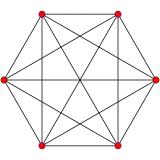 5-simplex |
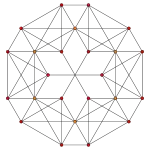 Truncated 5-simplex |
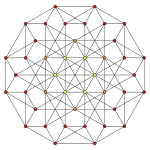 Bitruncated 5-simplex |
| Orthogonal projections in A5 Coxeter plane | ||
|---|---|---|
In five-dimensional geometry, a truncated 5-simplex is a convex uniform 5-polytope, being a truncation of the regular 5-simplex.
There are unique 2 degrees of truncation. Vertices of the truncation 5-simplex are located as pairs on the edge of the 5-simplex. Vertices of the bitruncation 5-simplex are located on the triangular faces of the 5-simplex.
Truncated 5-simplex
| Truncated 5-simplex | ||
| Type | Uniform 5-polytope | |
| Schläfli symbol | t{3,3,3,3} | |
| Coxeter-Dynkin diagram | ||
| 4-faces | 12 | 6 {3,3,3} 6 t{3,3,3} |
| Cells | 45 | 30 {3,3} 15 t{3,3} |
| Faces | 80 | 60 {3} 20 {6} |
| Edges | 75 | |
| Vertices | 30 | |
| Vertex figure | 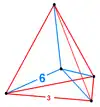 ( )v{3,3} | |
| Coxeter group | A5 [3,3,3,3], order 720 | |
| Properties | convex | |
The truncated 5-simplex has 30 vertices, 75 edges, 80 triangular faces, 45 cells (15 tetrahedral, and 30 truncated tetrahedron), and 12 4-faces (6 5-cell and 6 truncated 5-cells).
Alternate names
- Truncated hexateron (Acronym: tix) (Jonathan Bowers)[1]
Coordinates
The vertices of the truncated 5-simplex can be most simply constructed on a hyperplane in 6-space as permutations of (0,0,0,0,1,2) or of (0,1,2,2,2,2). These coordinates come from facets of the truncated 6-orthoplex and bitruncated 6-cube respectively.
Images
| Ak Coxeter plane |
A5 | A4 |
|---|---|---|
| Graph |  |
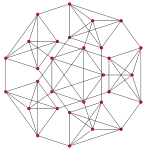 |
| Dihedral symmetry | [6] | [5] |
| Ak Coxeter plane |
A3 | A2 |
| Graph | 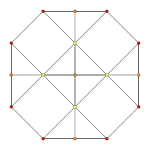 |
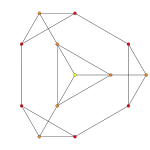 |
| Dihedral symmetry | [4] | [3] |
Bitruncated 5-simplex
| bitruncated 5-simplex | ||
| Type | Uniform 5-polytope | |
| Schläfli symbol | 2t{3,3,3,3} | |
| Coxeter-Dynkin diagram | ||
| 4-faces | 12 | 6 2t{3,3,3} 6 t{3,3,3} |
| Cells | 60 | 45 {3,3} 15 t{3,3} |
| Faces | 140 | 80 {3} 60 {6} |
| Edges | 150 | |
| Vertices | 60 | |
| Vertex figure | 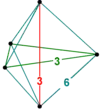 { }v{3} | |
| Coxeter group | A5 [3,3,3,3], order 720 | |
| Properties | convex | |
Alternate names
- Bitruncated hexateron (Acronym: bittix) (Jonathan Bowers)[2]
Coordinates
The vertices of the bitruncated 5-simplex can be most simply constructed on a hyperplane in 6-space as permutations of (0,0,0,1,2,2) or of (0,0,1,2,2,2). These represent positive orthant facets of the bitruncated 6-orthoplex, and the tritruncated 6-cube respectively.
Images
| Ak Coxeter plane |
A5 | A4 |
|---|---|---|
| Graph |  |
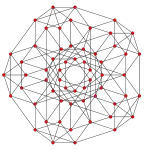 |
| Dihedral symmetry | [6] | [5] |
| Ak Coxeter plane |
A3 | A2 |
| Graph | 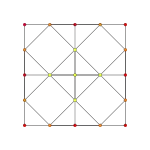 |
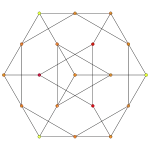 |
| Dihedral symmetry | [4] | [3] |
Related uniform 5-polytopes
The truncated 5-simplex is one of 19 uniform 5-polytopes based on the [3,3,3,3] Coxeter group, all shown here in A5 Coxeter plane orthographic projections. (Vertices are colored by projection overlap order, red, orange, yellow, green, cyan, blue, purple having progressively more vertices)
| A5 polytopes | |||||||||||
|---|---|---|---|---|---|---|---|---|---|---|---|
 t0 |
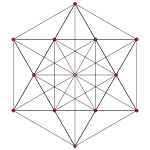 t1 |
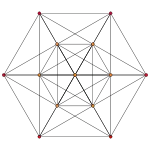 t2 |
 t0,1 |
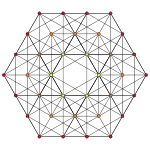 t0,2 |
 t1,2 |
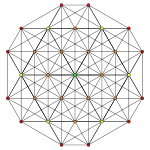 t0,3 | |||||
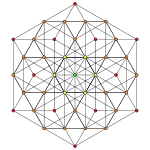 t1,3 |
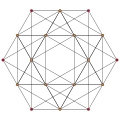 t0,4 |
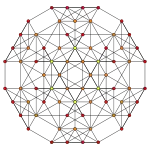 t0,1,2 |
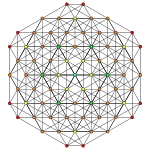 t0,1,3 |
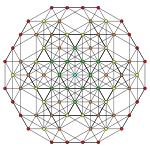 t0,2,3 |
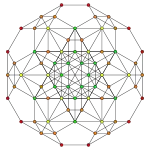 t1,2,3 |
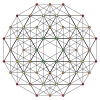 t0,1,4 | |||||
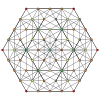 t0,2,4 |
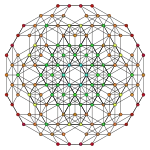 t0,1,2,3 |
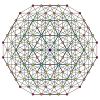 t0,1,2,4 |
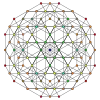 t0,1,3,4 |
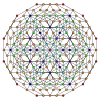 t0,1,2,3,4 | |||||||
Notes
References
- H.S.M. Coxeter:
- H.S.M. Coxeter, Regular Polytopes, 3rd Edition, Dover New York, 1973
- Kaleidoscopes: Selected Writings of H.S.M. Coxeter, edited by F. Arthur Sherk, Peter McMullen, Anthony C. Thompson, Asia Ivic Weiss, Wiley-Interscience Publication, 1995, ISBN 978-0-471-01003-6
- (Paper 22) H.S.M. Coxeter, Regular and Semi Regular Polytopes I, [Math. Zeit. 46 (1940) 380-407, MR 2,10]
- (Paper 23) H.S.M. Coxeter, Regular and Semi-Regular Polytopes II, [Math. Zeit. 188 (1985) 559-591]
- (Paper 24) H.S.M. Coxeter, Regular and Semi-Regular Polytopes III, [Math. Zeit. 200 (1988) 3-45]
- Norman Johnson Uniform Polytopes, Manuscript (1991)
- N.W. Johnson: The Theory of Uniform Polytopes and Honeycombs, Ph.D.
- Klitzing, Richard. "5D uniform polytopes (polytera)". x3x3o3o3o - tix, o3x3x3o3o - bittix
External links
- Glossary for hyperspace, George Olshevsky.
- Polytopes of Various Dimensions, Jonathan Bowers
- Truncated uniform polytera (tix), Jonathan Bowers
- Multi-dimensional Glossary